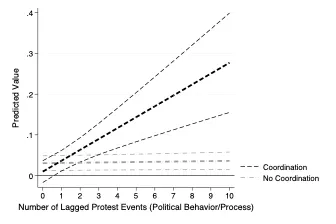Elite Coordination and Popular Protest: The Joint Effect on Democratic Change
 Predicted change in democracy score
Predicted change in democracy scoreAbstract
Authoritarian elections offer a window of contestation where a democratic opposition may increase the pressure on authoritarian regimes to implement democratic change. Pressure may come either from popular protest (vertical threats), or from a coordinated counter-elite (lateral threats). Previous research on electoral authoritarianism has emphasized the importance of both lateral and vertical threats for democratization, but have not theorized how these two threats interact to promote higher levels of democracy. We argue that the effect of vertical threats is contingent on the existence of lateral threats. Popular mobilization is more likely to promote democratic change if a unified opposition translates popular grievances to democratic demands. Conversely, a mobilized population increases the probability that a unified opposition will enhance democratic change by increasing the reputational and organizational costs of repression and electoral manipulation. Our theoretical claims are corroborated by statistical analysis of 169 elections, held in 74 electoral autocracies around the globe 1991–2014.
Type
Publication
Democratization